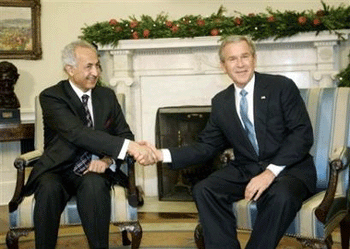|
General in Iraq expects troop levels to drop
(AP)
Updated: 2005-12-17 14:23 WASHINGTON - The top U.S.
military commander in Iraq said Friday he would make recommendations in the next
few weeks about troop withdrawals from Iraq, and he expects the force level will
drop back to 138,000 by early February. That has been the usual number this
year.
Speaking from Iraq, Gen. George Casey told Pentagon reporters that by late
next fall, the Iraqi military should be able to largely take the lead in the
country's defense, with continued support from U.S. and coalition transition
teams.
"We just had the election, we're doing our assessments, and I'll make some
recommendations in the coming weeks here about whether I think it's prudent to
go below that baseline," said Casey, adding that the two extra battalions that
were sent to Iraq for election security will be heading home in January.
But he made it clear that U.S. forces will still be in the lead in portions
of Iraq until sometime in 2007. Depending on the progress of the new Iraqi
government ministries, he said it will take until then for Iraqi security to be
able to completely take control of its forces across the country. As Iraqi
security takes over, U.S. troops will be able to withdraw.
And even with Iraqi forces in the lead, some levels of U.S. support would
still be needed for support. There are about 153,000 U.S. troops in Iraq now.
Casey also said the Iraqi police forces would not be able to take charge of
internal security until late next year or early 2007.
Coming on the heels of what U.S. officials have touted as a successful
parliamentary election in Iraq Thursday, Casey tempered his comments saying he
expects insurgents to escalate their attacks to demonstrate they are still a
force to be reckoned with.
"We should not expect the insurgency to just go away because of yesterday's
great success," he said. "But we should expect it to be gradually weakened and
reduced as more and more Iraqis adopt the political process and the root causes
of the insurgency are addressed by the new Iraqi government and by the
coalition."
Meanwhile, President Bush said Thursday's parliamentary elections represented
"a glorious day."
"It was a remarkable day yesterday in the history of mankind and in the
history of freedom," the president said in the Oval Office alongside Iraq's
ambassador to the United Nations, Samir Sumaidaie.
Sumaidaie pleaded with the United States to stick with Iraq until it is
stable.
"I believe that yesterday was a great day for Iraq. It was a great day for
freedom," he said. "I think it was a turning point and the beginning of the end
of terrorism in Iraq."
Casey said conditions along Iraq's border with Syria have improved, leading
to a decrease in suicide bombings. He said coalition operations have restored
Iraqi control of the border and the Syrians appear to have taken steps to pick
up foreign fighters coming through there. As a result, he said, suicide attacks
declined from more than 60 last June, to less than one a day this month.

President Bush
shakes hands with Iraqi Ambassador to the United Nations, Samir Shakir
al-Sumaydi in the Oval Office of the White House, Friday, Dec. 16, 2005 in
Washington. [AP] |
|
In contrast, he said Iran appears to have meddled more than any other border
country in the Iraqi election.
"And I believe that they will continue to attempt to influence the formation
of this government over the coming weeks to get a government that they believe
is supportive of their interests," he said. "That is worrisome and it is a
challenge for us."
Battles between various factions of the insurgency, particularly in
Sunni-dominated regions of the country, helped tamp down election-day violence,
he said, as Sunni's fought back against al-Qaida efforts to prevent them from
going to the polls.
In other comments, Casey said that an ongoing investigation into a Pentagon
propaganda program that pays to plant favorable articles in the Iraqi media has
not yet found anything that would prompt him to cancel or suspend the operation.
The investigation will be completed in about a week, he said.
Casey's discussion of troop levels came amid growing pressure from Congress
and the American public to begin withdrawing U.S. forces from Iraq. While the
Pentagon has refused to publicly detail any withdrawal, defense officials have
said the Pentagon has tentative plans to halt the scheduled deployment of two
brigades to Iraq. Instead, smaller transition teams would be sent to support and
train Iraqi forces, and much of one brigade, which is currently in Kuwait, would
return to its home base in Germany. The officials did not want to be identified
because the plans are not final.
One of the officials said Defense Secretary Donald H. Rumsfeld is expected to
announce next week that most of the 4th Brigade, 10th Mountain Division, based
at Fort Polk, La., will not go to Afghanistan as initially planned.
A brigade normally numbers about 3,500.
|